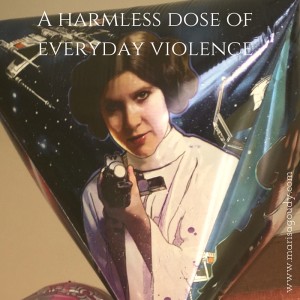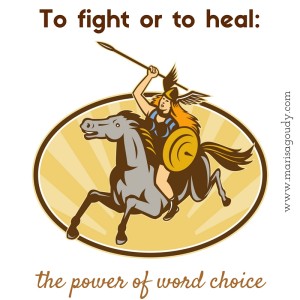
BLOG
To fight or to heal: the power of word choice
Sovereign Standard, Issue 37 “Write as you speak.”
“Write as you speak.”
Generally, this is the right advice when someone is stuck in academic or clinical writing mode or just can figure out what to say.
Like most advice, you need to decide if it applies to you before you even consider taking it to heart.
You probably don’t really want to write as you speak.
Not if you’re prone to the occasional f-bomb. Not if you’re the kind of person who stops herself mid-ramble with “oh, am I still talking?” Not if you pepper your speech with expressions that need to be heard aloud to be understood.
You can say that, but you might not want to be quoted
Even when speaking with clients, you aren’t nearly as mindful of your words as you must be when you publish on a professional website or enter an online conversation with group of colleagues.
After all, when you put ideas into text, you don’t have tone and gesture to rely on. The words just sit there, waiting to be interpreted by the reader.
How challenging! How terrifying!
Your metaphors create your writing’s tone of voice
We use most of our metaphors and expressions unconsciously. And we can say some brutal things without even realizing it.
Common phrases become so familiar that they lose important aspects of meaning.
Everyone knows what “rule of thumb” means when it’s used to discuss a general guideline of some kind, but how many of us remember this phrase’s origins? It actually refers to the width of the stick a man could legally use to beat his wife.
As a healing professional, as a creative entrepreneur dedicated to making the world more beautiful, bearable, and bold, the last thing you want to do is promote violence.
But are you accidentally injecting words of warfare and conflict into your writing?
The everyday violence in our language and in our world
 If you are using violent images without thinking about it, you’re not alone.
If you are using violent images without thinking about it, you’re not alone.
I definitely just bought a balloon with guns all over it for my six year-old daughter's birthday. In my defense, "Because Princess Leia and Han Solo" seems to sidetrack many conscious moms and dads' dedication to peaceful parenting. But the casual injection of violence is not just a Star Wars blind spot.
Writers are trained to take their readers prisoner.
Writers are told that they must “grab” or “hook” or “capture” the reader. But think about those metaphors. Their theme is violence and compulsion. They suggest a relationship you might want to have with a criminal, not a reader. - Tracy Kidder and Richard Todd, Good Prose
Marketers are groomed to force themselves upon you.
A testimonial is “punching people in face with value. - David Newman, Do It! Marketing: 77 Instant-Action Ideas to Boost Sales, Maximize Profits, and Crush Your Competition
People suffering from disease are told to arm up.
Join the fight to kill cancer. - United Cancer Foundation
Sometimes, you want to be a warrior
 I’m not arguing that we need to become complete pacifists.
I’m not arguing that we need to become complete pacifists.
There are days when I need to enter my “warrior woman” mindset to get through the day despite the exhaustion, the stacks of dirty dishes, and the endless demands of a business that relies completely on my own ability to show up and do the work.
As long as no one gets hurt, I’m ok with writing into what Traditional Astrologist Molly Morrissey calls the “Mars energy” and using every martial word in my arsenal to combat grime, dirt, mold, stains, waste, and weeds (thanks, MKN!).
And sometimes, words do cause harm
In Having cancer is not a fight or a battle, Kate Granger asks “Why is military language used to describe cancer? These words are meant to help patients but can have the opposite effect."
I refuse to believe my death will be because I didn't battle hard enough.
Your writing matters. There are no throwaway phrases.
Don’t let a fear of offending readers you’ve never met keep you from writing and publishing. Trust yourself and trust your own good intentions.
Allow your shoddy first drafts to clunk with cliches. Mix your metaphors with wild abandon until you settle on the unifying image that ties together a section or an entire piece.
Don’t be afraid to step into the trenches and give it your best shot. But just be aware, by the time you reach your final version, you might want to say you engaged deeply with the experience and did your best.
Often, a warlike metaphor is best replaced by a straightforward truth.
Let's make our shared discourse a little more conscious and peaceful. Please share this post and subscribe to receive the Sovereign Standard each week.
